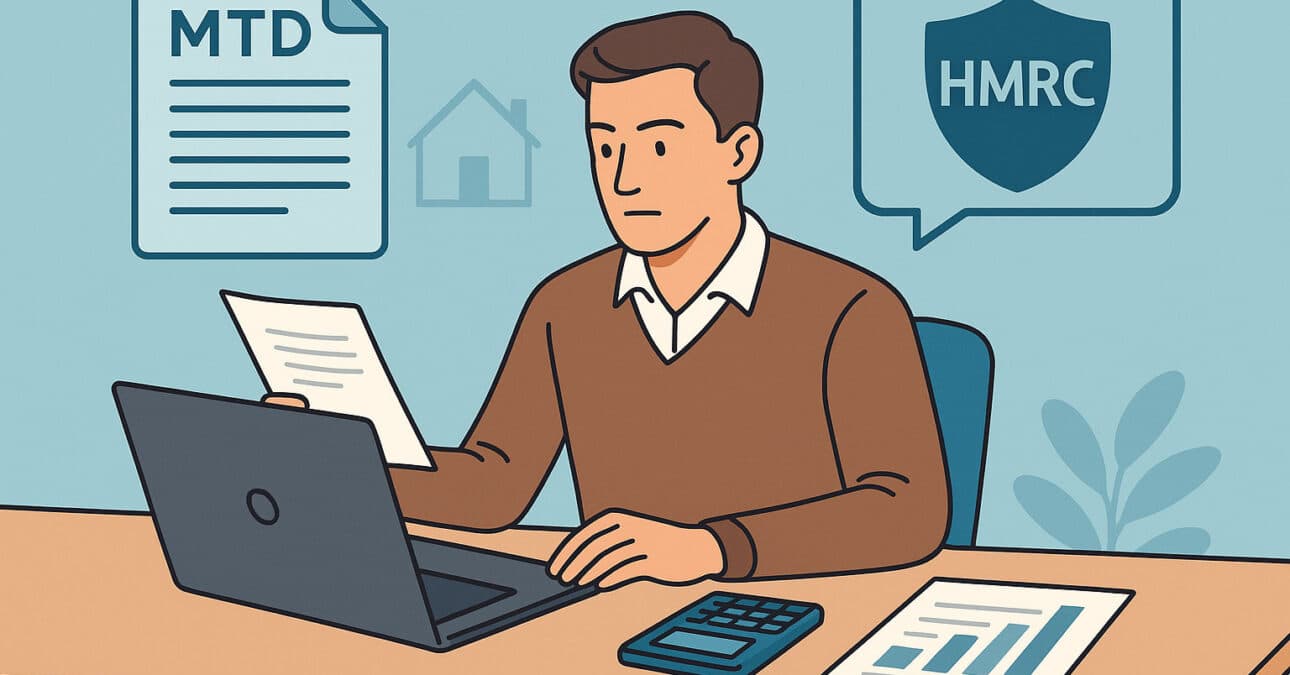How to prepare for MTD as a landlord

How to prepare for MTD as a landlord
What is MTD or Making Tax Digital?
Let’s take a closer look at what Making Tax Digital means for landlords in reality.
Making Tax Digital (MTD) is a government program in the UK led by HM Revenue and Customs (HMRC). The objective of this initiative is to simplify the process of keeping track of one’s tax affairs and to reduce the number of errors that occur through the use of digital record-keeping and submission.
Importance of MTD for Landlords
When it comes to landlords, the Making Tax Digital (MTD) initiative offers a major change in the way in which rental income is recorded to HMRC. It is of the greatest importance for landlords since it has an effect on how they maintain records, file taxes, and remain in compliance with the tax law in the UK.
1. Legal Requirement starting April 2026
- Starting in April 2026, you will be required to comply with the MTD for Income Tax Self-Assessment (ITSA) if your total income from property and/or self-employment is greater than £50,000.
- In April of 2027, the threshold will be reduced to £30,000.
- If you fail to comply with the regulations of MTD, you may be subject to penalties.
2. Enhanced Record-keeping
- It is important that landlords maintain digital records of their revenue and expenses.
- The possibility of losing receipts or making mistakes by hand is decreased as a result of this.
- Having better records allows landlords to more accurately track their gross rental income and claim deductions.
3. Better Cash Flow Management
- MTD requires that landlords provide HMRC with quarterly updates.
- This helps with budgeting and prevents surprises on the last day of the year by keeping tax liabilities visible throughout the year.
4. There is less room for mistakes
- In comparison to manual entry, software that is compatible with MTD helps to automatically calculate figures and reduces the number of mistakes that occur.
- This means that tax returns are more accurate and reduces the possibility of investigations being conducted by HMRC.
5. Future-Proofing
- MTD is a part of a more comprehensive digital transformation of the taxation system in the UK.
- Getting familiar with digital systems now makes it easier to adjust to changes in the future, such as the MTD for Corporation Tax, which will be applicable if you incorporate your property business.
6. Competence in the field and efficiency
- When using software that is compatible with MTD, reporting and analysis are improved.
- Landlords can boost their portfolios and show accurate records to mortgage brokers, investors, or accountants with the assistance of this opportunity to comply with MTD for ITSA.
What is Making Tax Digital for Income Tax?
Making Tax Digital for Income Tax is a part of the government’s aim to digitalise the tax system in the UK and simplify the process of ensuring that your taxes are filed properly.
MTD will begin to implement its first phase in April 2026. Those who are self-employed and make more than £50,000 annually are required by the rules to use software that is compatible with MTD to prepare for making tax digital.
1. Maintain Digital Records
- Maintain a record of all income and expenses using software that is compatible with MTD.
2. Send Quarterly Updates to HMRC
- The HMRC should get reports of your revenue and expenses through your software once every three months.
3. Submit an End-of-Period Statement (EOPS)
- This verifies that the quarterly updates you have provided are accurate and complete.
4. Submit a Final Declaration
- Any personal income, including interest, dividends, and other forms of revenue, is included.
- Substitutes the traditional self-assessment tax return.
As a result, MTD may appear to be a significant change for people who are not familiar with cloud-based software and digital tax reporting for rental income, It is time to start making preparations.
How landlords can calculate their income for Making Tax Digital
To determine your income for Making Tax Digital, put together all property and sole trader income, including rental income and income from any side hustles.
If you make £50,000 from property alone or a combination of property and sole trader revenue, you must sign up for MTD.
Limited company accounts and company tax returns should continue to be shared with HMRC and Companies House by landlords who are registered as limited companies but who are also landlords.
How do landlords register for MTD for Income Tax?
You can register for MTD for IT if you are already enrolled for self-assessment, if you are on top of your returns and payments, and if you have software that is recognised by HMRC. In case you are unsure of how to proceed, you should get in touch with the software vendor that you are using.
Is it possible for an accountant to register a landlord for the MTD for income tax?
Certainly. Before the mandate takes effect, you will be required to register. For information on how to sign up for MTD for IT, talk to your bookkeeper or accountant.
Would it be beneficial for landlords to voluntarily sign up for MTD for Income Tax?
As a result of your early registration for MTD for IT, you will have the opportunity to prepare for making tax digital and get familiar with the new reporting requirements. Now is the time to start digitally submitting your rental income taxes; all you need to do is use cloud-based software. As a result, you will already comply with the MTD standards the moment the Income Tax deadlines draw near.
Does the income from selling a house contribute towards MTD for income tax?
When it comes to income tax, the money that is earned from the sale of a property does not contribute towards MTD; rather, this income is subject to capital gains tax. Within the first 60 days after the sale, you will be required to record and pay this tax.
As a Landlord, how can you prepare for MTD?
Installing appropriate software and becoming familiar with the standards that HMRC has set forth for landlords should be the first thing you do.
Put aside some time to perform your accounting tasks regularly. Going from one annual return to four quarterly updates requires you to submit income and expense information more often.
Hire a bookkeeper or accountant who specialises in working with landlords. Our network is filled with lawyers who are knowledgeable about the tax duties of landlords.
In what cases is MTD for Income Tax not applicable to landlords?
There are a few exceptions to MTD for income tax regulations. Below are some of the instances:
1. Income That Is Lower Than Threshold
You are exempt from complying with the MTD requirements until April 2026 if your total gross income from self-employment and/or property is less than £50,000 If it is less than £30,00, you are exempt until at least April 2027. Even after that, you won’t be required to join unless the rules are changed by HMRC. The term “gross income” refers to the whole amount of income you make from rent before deducting any expenses.
2. Jointly Owned Properties
The MTD applies to sole owners of rental properties as opposed to property partnerships. If you own a rental property with someone else, such as a spouse, each person’s part of the income is calculated separately. In light of this, it is possible that you will not be required to comply with the MTD guidelines if the amount of rental revenue that you collect is less than the threshold.
3. Non-UK Residents with No UK Tax Liability
If you are a landlord who does not reside in the UK and does not have to complete a self-assessment in the United Kingdom (for example, because of tax treaties or because you have zero net income), then MTD does not apply to you.
4. Exemptions for Specific Individuals
If you are unable to use digital tools due to your beliefs about religion, if you reside in an area with limited internet access, or if you have a handicap, age-related disease, or serious illness, you may be entitled to apply for an exemption from the MTD. If you fall into any of these categories, you are required to apply to HMRC to be officially exempt from the digital obligations.
5. Trusts, Estates, and Companies
Trusts, estates of deceased individuals, limited companies, and partnerships are not subject to the requirements of the MTD for income tax. It is expected that the MTD rules for partnerships will be implemented at a later stage, while limited corporations will benefit from the MTD for Corporation Tax in the future.
6. No UK Rental Activity
According to the ITSA (Income Tax Self Assessment), you do not have to follow MTD if you are registered for Self Assessment, but you are no longer receiving rental income.
How does Western Lettings assist landlords in getting ready for Making Tax Digital?
Western Lettings Glasgow assists landlords in staying updated on changes that are relevant to them, particularly in light of the implementation of Making Tax Digital for landlords. Starting April 2026, landlords need to maintain digital records of their property income, use MTD-compatible software, and submit changes during the tax year.
Western Lettings Glasgow makes use of digital technologies that simplify the management of income and spending, and it also provides assistance to clients in the use of accounting software that is compatible with the MTD regulations of HMRC. The preparation of quarterly updates, your self-assessment tax return, or the end of the tax year are all examples of situations in which they assist you in complying with MTD without causing you concern. In addition, they will guide you if you are new to MTD or if you are using new software, ensuring that you are prepared to use MTD in the right way.


